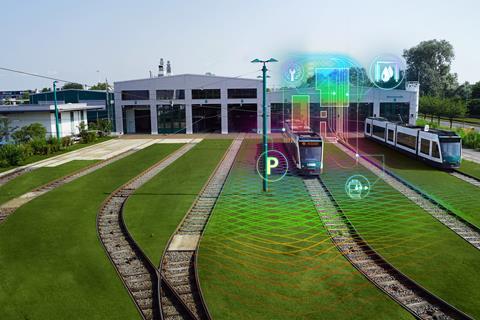
GERMANY: Research into the development of a fully-automated tram depot is to be undertaken in Potsdam by a consortium led by Siemens Mobility.
The three-year AStriD (Autonomous Tram in Depot) project is being funded by the federal Ministry for Transport & Digital Infrastructure’s mFUND research initiative. It will build on earlier work by Siemens and ViP Verkehrsbetrieb Potsdam that saw a driverless tram demonstrated in the city last year, representing what Siemens Mobility CEO Sabrina Soussan described as ‘the next big milestone on the way to autonomous trams’.
The aim is to develop a ‘digital depot’, where trams can be moved between the stabling roads, washing plant and workshops in driverless mode, using the existing ViP facilities to demonstrate the technical feasibility of the concept. Making depot automation commercially viable over the medium term is seen as the first step towards automated tram operation, and the project will also consider the legal framework necessary for the approval and operation of driverless trams in revenue service, as well as the business case.
AStriD is divided into a number of work packages. Siemens Mobility will be responsible for developing the automated tram technology and integrating the vehicle into a data hub provided by Codewerk, which will also provide the cloud and edge computing systems needed for data integration. ViP will provide the tram and depot infrastructure, as well as access to required data, systems and facilities. It will also evaluate the results from the operator’s perspective.
Vehicle localisation will make use of a digital map to be developed by Mapillary. This will use a cloud-based platform for the collection and analysis of street images and relevant information which will be processed using artificial intelligence.
The project will be supported by the Institute for Information Processing Technology at Karlsruhe Institute of Technology, which specialises in process automation. The Institute for Climate Protection, Energy & Mobility will assess legal issues around driverless operation, as well as the impact on operating costs.
ViP Managing Director Monty Balisch said that ‘a practical demonstration of the measures that could be promptly implemented will be helpful for us and the whole industry. We will be checking to see whether and how time-consuming shunting operations in a depot can be fully automated.’ He believed that this could be an ‘interesting option’, both for ViP’s existing depot and for a proposed second operating base in the north of Potsdam.



